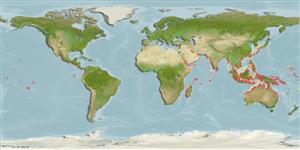sub class Elasmobranchii (ฉลามและกระเบน) (sharks and rays) >
Myliobatiformes (Stingrays) >
Gymnuridae (Butterfly rays)
Etymology: Gymnura: Greek, gymnos = naked + Greek, oura = tail (Ref. 45335).
More on author: Shaw.
Environment: milieu / climate zone / depth range / distribution range
นิเวศวิทยา
เกี่ยวกับทะเล,น้ำเค็ม สัตว์น้ำหน้าดิน; ระดับความลึก ? - 80 m (Ref. 9773). Tropical
Indo-Pacific: Persian Gulf (Ref. 68964), Red Sea to French Polynesia, north to Japan. Also reported from Persian Gulf (Ref. 96002).
Length at first maturity / ขนาด / น้ำหนัก / Age
Maturity: Lm 48.0 range ? - ? cm
Max length : 250 cm WD เพศผู้/กระเทย; (Ref. 30573)
Ovoviviparous (Ref. 50449). Caught often in demersal trawls, and occasionally by trammel net. Utilized for its meat, but of limited value due to its typically small size (Ref. 58048).
Exhibit ovoviparity (aplacental viviparity), with embryos feeding initially on yolk, then receiving additional nourishment from the mother by indirect absorption of uterine fluid enriched with mucus, fat or protein through specialised structures (Ref. 50449). Distinct pairing with embrace (Ref. 205). Gives birth to litters of up to 7 pups; born at 24-26 cm WD (Ref. 58048).
Sommer, C., W. Schneider and J.-M. Poutiers, 1996. FAO species identification field guide for fishery purposes. The living marine resources of Somalia. FAO, Rome. 376 p. (Ref. 30573)
IUCN Red List Status (Ref. 130435)
Threat to humans
Harmless
Human uses
การประมง: การค้า
เครื่องมือ
Special reports
Download XML
แหล่งที่มาจากอินเตอร์เน็ต
Estimates based on models
Preferred temperature (Ref.
123201): 25.2 - 29.2, mean 28.5 °C (based on 2718 cells).
Phylogenetic diversity index (Ref.
82804): PD
50 = 0.5000 [Uniqueness, from 0.5 = low to 2.0 = high].
Bayesian length-weight: a=0.00617 (0.00386 - 0.00986), b=3.06 (2.92 - 3.20), in cm total length, based on LWR estimates for this species & (Sub)family-body (Ref.
93245).
ระดับชั้นอาหาร (Ref.
69278): 3.8 ±0.59 se; based on food items.
ความสามารถในการกลับคืนสู่ปกติ (Ref.
120179): ต่ำมาก, เวลาต่ำสุดที่จะทำให้ประชากรเพิ่มขึ้นเป็น 2 เท่าใช้เวลามากกว่า 14 ปี (Fec=1-6).
Fishing Vulnerability (Ref.
59153): Moderate to high vulnerability (51 of 100).
Nutrients (Ref.
124155): Calcium = 18.6 [5.1, 96.5] mg/100g; Iron = 0.633 [0.154, 1.772] mg/100g; Protein = 22.5 [19.0, 25.4] %; Omega3 = 0.159 [0.044, 0.512] g/100g; Selenium = 54.2 [15.2, 177.9] μg/100g; VitaminA = 9.18 [3.08, 26.74] μg/100g; Zinc = 0.584 [0.276, 1.078] mg/100g (wet weight);
